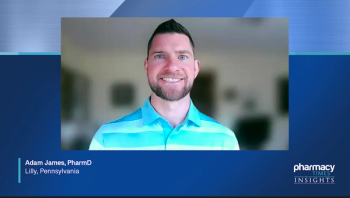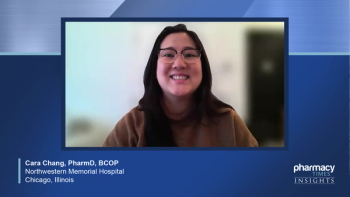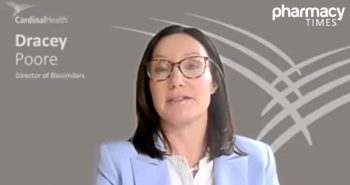
RSV vaccines for pregnant women and infants require careful timing and administration.

RSV vaccines for pregnant women and infants require careful timing and administration.

A panelist discusses key insights for pharmacists to prioritize, including staying informed about new respiratory syncytial virus (RSV) vaccines such as Arexvy and Abrysvo, educating patients on the benefits of vaccination, monitoring common adverse effects, ensuring timely access to vaccines, and playing a crucial role in supporting patient safety and prevention efforts for RSV.

A panelist discusses recent advancements in the respiratory syncytial virus (RSV) vaccine space, including the approval of Arexvy and Abrysvo for older adults and pregnant individuals, the development of promising mRNA and protein subunit vaccines for high-risk groups, and ongoing studies to optimize dosing schedules and booster needs, all aimed at reducing RSV-related hospitalizations and deaths.

Christian John Lillis reflects on key insights from the 2025 Peggy Lillis Foundation C diff Summit, highlighting the critical role of pharmacists in infectious disease care, persistent challenges in patient outcomes, and the need for renewed investment in public health infrastructure and policy.

Christian John Lillis discusses the 2025 Peggy Lillis Foundation C diff Summit, emphasizing the enduring need for community-building among survivors, the importance of sustained public health advocacy, and the growing urgency to defend federal health agencies amid political and institutional uncertainty.

Panelists discuss how second-line therapy selection and individualized care strategies are essential in chronic graft-vs-host disease (cGVHD) management, emphasizing the need to reduce steroid-related toxicity, address patient-specific factors, and leverage pharmacist expertise to optimize outcomes.

A panelist discusses how evidence-based protocols for managing infusion-related reactions have reduced hesitancy among health care providers to use agents like amivantamab, empowered the entire care team with knowledge, and balanced the benefits and challenges of oral vs intravenous (IV) chemotherapy administration in relation to patient autonomy, adherence, and quality of life.

Panelists discuss how early diagnosis, evolving treatment strategies, and pharmacist-led interventions are advancing chronic graft-vs-host disease (cGVHD) management by addressing unmet needs, improving care coordination, and enhancing patient access to emerging therapies.

A panelist discusses how clinical trials and institutional guidelines have improved the management of infusion-related reactions (IRRs) through standardized premedication protocols, including the SKIPPirr trial, which demonstrated that home dexamethasone use prior to amivantamab infusions can significantly reduce reaction rates from 67% to 22.5%.

Experts emphasize the importance of tailored vaccination strategies for pneumococcal based on individual risk factors.

RSV vaccination for older adults requires understanding risk factors, using empathetic communication strategies, and proactively identifying eligible patients through careful review of medical histories and care transitions.

Don Moore, PharmD, BCPS, BCOP, DPLA, FCCP, FASHP, received a leadership award at the 2025 HOPA Annual Meeting.

A panelist discusses how physicians can support pharmacists in monitoring respiratory syncytial virus (RSV) vaccine adverse events (AEs), such as soreness, fatigue, and headache, while using clear, empathetic communication to educate patients about the temporary nature of these symptoms and the significant benefits of preventing severe RSV illness.

Panelists discuss how health care teams can ensure patients remain on optimal low-density lipoprotein cholesterol (LDL-C)–lowering therapy by leveraging collaborative strategies, facilitating therapy intensification, and incorporating essential components into shared decision-making tools to personalize treatment plans.

A panelist discusses how physicians can collaborate with pharmacists to share patient information, coordinate vaccine schedules, and reinforce recommendations, while utilizing resources such as CDC guidelines, patient brochures, and digital tools to provide clear, evidence-based education on RSV prevention and vaccination.

Panelists discuss how medical professionals consider PCSK9 inhibitors, bempedoic acid, and inclisiran in various clinical scenarios, their experiences with these newer therapies, the implications of the INCEPTION trial for treating patients with high-risk cardiovascular disease—particularly those who are statin-intolerant—the urgency of postcoronary event treatment, and emerging data on the broader impact of low-density lipoprotein cholesterol (LDL-C)–lowering therapies on quality of life.

A panelist discusses how to minimize EGFR tyrosine kinase inhibitor (TKI) adverse effects through preventive measures such as maintaining good skin regimens with moisturizers and SPF 30+ sunscreen, prescribing topical steroids and antibiotics for skin rash, and managing diarrhea with hydration, diet modifications, and loperamide.

A panelist discusses how EGFR tyrosine kinase inhibitors (TKIs) commonly cause dermatologic toxicities (including acneiform rash, dry skin, photosensitivity, and paronychia) and diarrhea, which can significantly impact patients’ quality of life by causing physical discomfort, affecting appearance, and limiting daily activities.

Logan Schneider, MD, highlights the importance of integrating patient-reported outcomes into clinical trials to better capture the full therapeutic impact of low-sodium oxybate (Xywav) beyond traditional sleep metrics.

PharmStart empowers pharmacy technicians to pursue their education with tuition-free prerequisites, addressing barriers to entering pharmacy school.

A panelist discusses how physicians can collaborate with community pharmacists to enhance respiratory syncytial virus (RSV) vaccine uptake by leveraging pharmacists' expertise in patient education, addressing vaccine hesitancy through empathetic communication, and emphasizing the safety, benefits, and risks of RSV vaccination.

Panelists discuss how evidence from a value-based care perspective demonstrates long-term health benefits, including reduced recurrent events and hospitalizations, as well as cost savings associated with intensive low-density lipoprotein cholesterol (LDL-C)–lowering therapies beyond statins in patients who are very high-risk post-atherosclerotic cardiovascular disease (ASCVD), while also addressing key challenges health care providers face in selecting nonstatin therapies and strategies to overcome them.

A panelist discusses how physicians can navigate respiratory syncytial virus (RSV) vaccine selection by considering patient age, pregnancy status, and seasonality, highlighting the approved indications for Arexvy and Abrysvo, including maternal immunization to protect infants through passive immunity.

Panelists discuss how patients' access to and preferences for PCSK9 inhibitors and other treatments are influenced by factors such as insurance coverage, administration convenience, financial toxicity, and individual health concerns.

Lacy La Fever, PharmD, MS, discussed outcomes associated with different carboplatin AUC dosing strategies.

A panelist discusses how emerging advancements in non–small cell lung cancer (NSCLC) treatment include the anticipated FDA approval of subcutaneous amivantamab, which would significantly reduce infusion-related reactions seen in the MARIPOSA trials while improving patient experience and reducing infusion center chair time, as well as promising antibody-drug conjugates like sacituzumab govitecan (Trodelvy) that may provide better first and second-line treatment options with potentially less toxicity than current standard regimens.

Dracey Poore explores the future of biosimilars, emphasizing the need for increased adoption.

Specialty pharmacy experts discuss how emotional support, addressing patient loneliness, and peer-to-patient programs can significantly improve medication adherence and patient care.

UPMC enhances care for patients with heart failure through integrated pharmacy and cardiology team collaboration.

Experts emphasized the importance of addressing regulatory and payer-side challenges to fully leverage AI's potential in pharmacy settings.